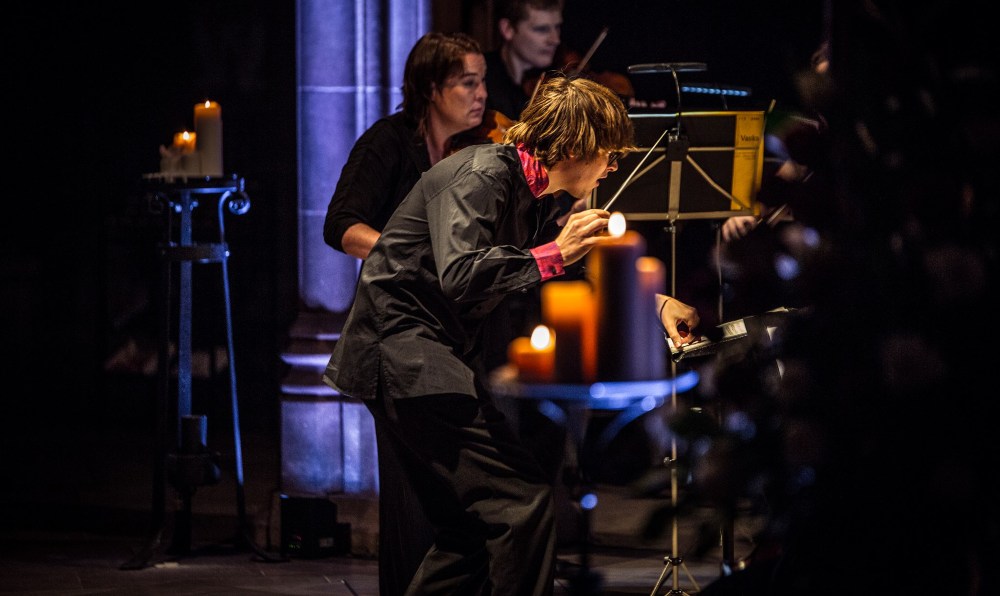
Hugo Ticciati: Barnes Boy
Chantal Borciani chats with violinist Hugo Ticciati about his alternative approach to classical music, achieving international acclaim and returning home to the Barnes Music Festival
Barnes-born Hugo Ticciati will open this year’s Barnes Music Festival (BMF) with a concert at St Mary’s on 7 March alongside his acclaimed ensemble, O/Modernt. Performing a largely English programme, Hugo’s production, Across the Universe, will include Britten’s theme and variations, and inspiring music by Roxanna Panufnik (another Barnes resident) and Gustav Holst among others.
The theme of the 2020 Barnes Music Festival is Musical Journeys, something the revered international violinist knows a lot about. His rather unusual path to professional musician, which includes some years in the Swedish wilderness, has no doubt influenced his formidable style, which is often characterised as innovative, daring and experimental by his peers. Hugo relishes combining old and new, improvising during performances and sweeping audiences up on a journey free of traditional shackles. With tickets now available for the BMF 2020 programme, we chatted to Hugo about his inspiration and returning home.
What was your childhood like?
I was born in Barnes and lived near the pond until I was 18. When I look back at my childhood I remember more the people I shared it with and what we did together, from chamber music jam sessions to Sunday afternoon cricket matches, choir trips, and camping holidays.
Where did you go to school?
I went to St. Paul’s School down Lonsdale Road. I was blessed to have an amazing time during my studies, surrounded by the most eclectic, broad-thinking and inspiring teachers in a whole array of subjects, and a great year of inquisitive fellow students.
When did you first pick up a violin?
When I was six-and-a-half. I started out on the piano but was quickly drawn to the magical sounds of the bowed strings. For as long as I can remember, it was the mysterious universe of sounds that always drew me in to discover worlds both within and beyond myself.
How did you end up on the road to becoming a professional musician?
By the end of my time at St Paul’s my violin playing had plateaued, and I decided to take the conventional path of a musicological degree at Cambridge. During the intervening summer, after I had taken my A levels, I met the leader of the English Chamber Orchestra, who said I ‘must play’ the violin, and recommended a teacher in Canada. Knowing it was what I wanted to do more than anything, I called Cambridge to defer by a year and bought a ticket to Canada. To cut a rather intense story short, however, I came back after nine months with pain in every part of my body, caused by practising too much in the wrong way, and I faced the prospect of being forced to give up my dream.
In the nick of time, Mark Tatlow, my St Paul’s music history teacher, suggested I should meet a Russian violinist who he thought might be able to help me. A ten-minute lesson with Nina Balabina was enough to make me call Cambridge again, this time to cancel my place, and buy a one-way ticket to Sweden, where Nina taught.
For four years I became a hermit: physically, I lived in a kind of isolation; violinistically, I played only scales, exercises and studies. They were the most wonderful and liberating years, freeing me from thoughts of a musical career, from the constraints of musical institutions, and above all giving me the space, time and silence simply to ‘be’. When I emerged from this hermetic hush and returned to the world of music, things gradually unfolded in a wonderfully natural manner.
Tell us about O/Modernt
Ten years ago I had the great honour to be asked by the late Kjerstin Dellert to start a music festival at Confidencen Ulriksdal’s Palace Theatre in Stockholm. The combination of my particular passion for contemporary music and the enchanting atmosphere of the Rococo theatre provided the inspiration for the festival O/Modernt (Swedish for ‘un/modern’): an exploration of the relationships between the work of old composers and the artistic creations of modern culture, be it in music, art, dance, creative writing, film, academia and so forth. As composer John Cage put it: “the past must be invented, the future must be revised.”
Since its inception O/Modernt has grown dramatically, now encompassing festivals and chamber music series in different countries, a chamber orchestra, an academy and a new generation artist programme.
What can audiences expect from the BMF concert?
A living, joyful and contemplative experience. Every O/Modernt concert is a unique instance of production in a continual flow of changes.
Was it important to you to include Barnes composer Roxanna Panufnik in your concert?
The fact that Panufnik is local is an added bonus; most important is the wonderfully moving and authentic quality of her music.
What does improvisation add to your performances?
It brings a vulnerable fluidity to the process, drawing the performer and audience into a shared space of potentiality, and heightens the awareness of both performer and audience to the fleeting reality of the present moment.
What non-classical music do you enjoy?
I love Indian music.
What would your Desert Island disc be?
John Cage’s 4’33’’, since it contains all other music.
Barnes Music Festival is on 7-22 March. Find tickets at www.barnesmusicfestival.com






